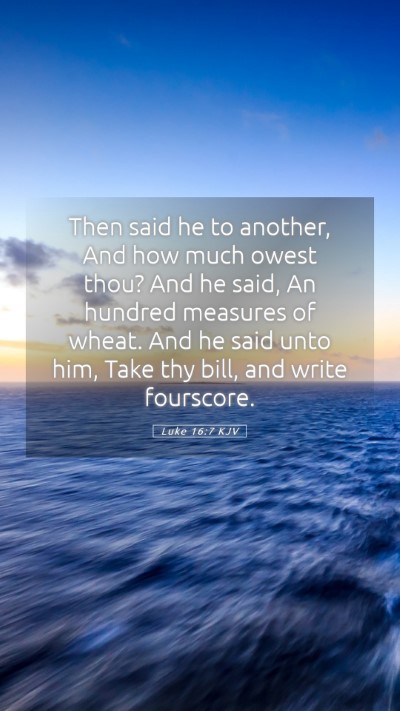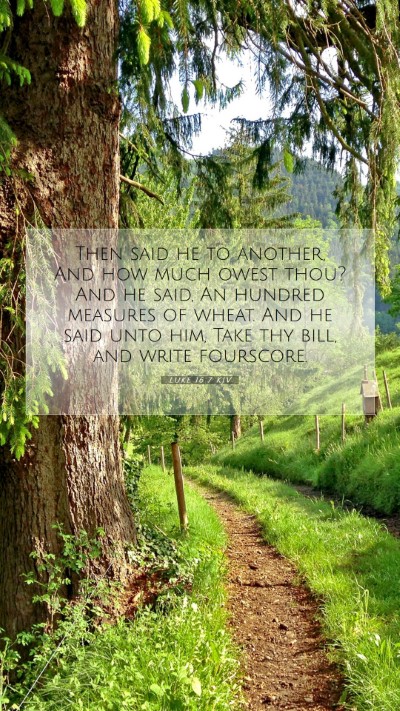Bible Verse Commentary: Luke 16:7
Luke 16:7 states, “Then said he to another, And how much owest thou? And he said, A hundred measures of wheat. And he said unto him, Take thy bill, and write fourscore.” This verse is part of the Parable of the Unjust Steward, which illustrates the cunning nature of worldly individuals and has important lessons regarding stewardship and the use of earthly resources.
Understanding Luke 16:7 involves exploring its place within the parable context, where the master commends the shrewdness of the steward who, facing dismissal, reduces the debts of his master's debtors to secure his future. This leads us to various insights captured in public domain commentaries:
-
Matthew Henry's Commentary:
Henry reflects on the urgency of the steward to make friends through mammon (wealth) before losing his job. He observes that this illustrates the principle of using temporal resources wisely, preparing for eternal values. It emphasizes the need to act wisely and thoughtfully in our management of God’s provisions as a faithful servant.
-
Albert Barnes' Notes:
Barnes explains how the steward was careful in action even amidst wrongdoing, reflecting human wisdom in handling affairs. He denotes that even though his actions were deceitful, there are lessons for believers on being prudent and cautious. This commentary raises an awareness about the contrast between secular wisdom and godly principles of stewardship.
-
Adam Clarke's Commentary:
Clarke discusses the phrase 'a hundred measures of wheat,' which highlights the enormity of the debt and the significance of writing off part of it. He suggests that the steward’s actions represented a manipulation sparked by self-interest but serve as a warning for Christians about moral integrity in monetary dealings.
Key Themes in Luke 16:7
This verse serves to remind Christians about key principles integral to biblical stewardship:
- Stewardship: The parable itself challenges believers to assess how they manage their resources.
- Wisdom in Action: The steward’s cunning demonstrates the necessity of being wise as serpents in a morally ambiguous world.
- Preparation for Future: The act of reducing debts signals the urgency of preparing for what lies ahead, both materially and spiritually.
Application of Luke 16:7
Applying this verse to daily life involves asking critical questions surrounding our management of wealth, relationships, and responsibilities:
- How can I use my resources to create lasting relationships both in this life and in eternity?
- Am I aware of the needs of others that may lie within my capacity to meet?
- What lessons can I learn from those who use their earthly knowledge for greater purposes?
Bible Study Insights
For those engaging in Bible study groups or seeking to deepen Bible study understanding, Luke 16:7 presents a valuable opportunity for in-depth Bible verse analysis and Bible study resources:
- Use this verse to discuss moral dilemmas surrounding finances in small groups.
- Explore personal experiences of stewardship in your daily life in the context of Christ's teachings.
- Engage with historical contexts that may underscore the parable's lessons on debt and relationships.
Related Scriptures
To further explore the themes presented in Luke 16:7, consider the following biblical cross-references:
- Matthew 6:24: “No man can serve two masters…” which emphasizes loyalty in service.
- Proverbs 22:7: “The rich rules over the poor, and the borrower is servant to the lender.” noting debt dynamics.
- Matthew 25:14-30: The Parable of the Talents, focusing on wise stewardship of God’s resources.
Conclusion
In sum, the exposition of Luke 16:7 reflects intricate layers of meaning surrounding stewardship, wisdom, and morality. Studying this verse within the context of supportive commentaries provides profound insights for those seeking Bible verse interpretations and Bible verse explanations. By engaging with these themes, believers can cultivate a deeper understanding of Scripture and apply its teachings faithfully to their lives.


